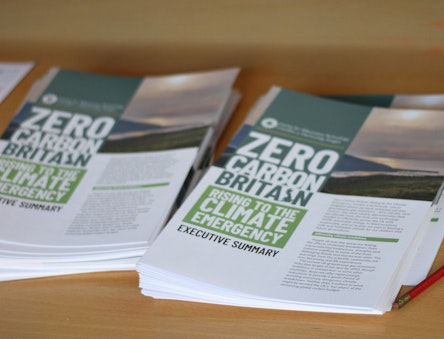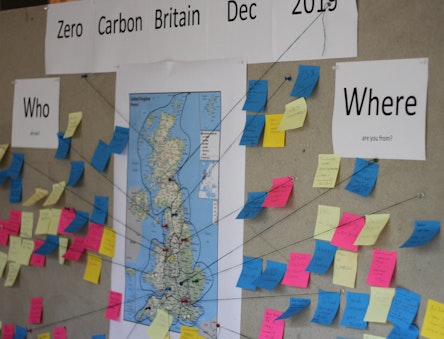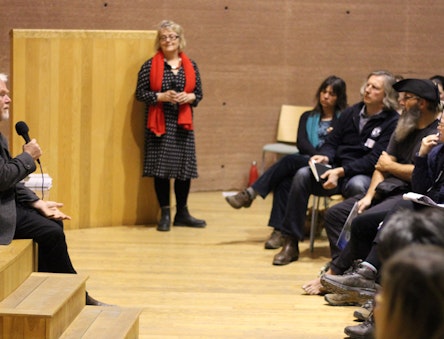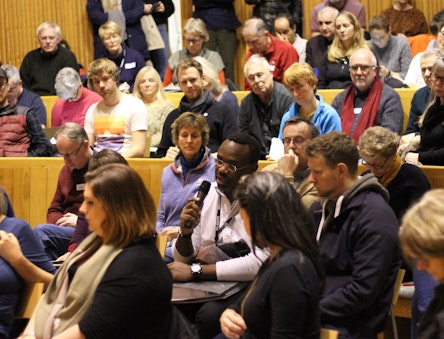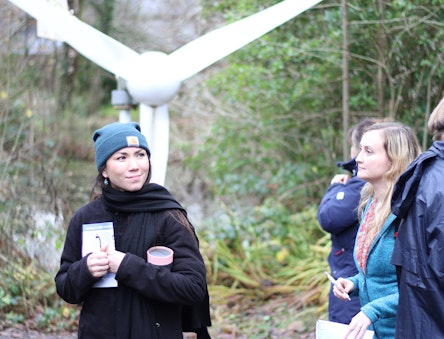
Zero Carbon Britain – Live at CAT – Scaling-up Community Action in the Climate and Ecological Emergency
March 09, 2024 - March 10, 2024Home » Zero Carbon Britain – Live at CAT – Scaling-up Community Action in the Climate and Ecological Emergency
How can communities take the next steps on their road to a just transition, engage effectively with the wider transition activity, and kick-start the implementation of local Zero Carbon Britain plans?
Continuing our theme on ‘Scaling-Up Community Action’, the Zero Carbon Britain Team is hosting a two-day, in person, gathering at CAT where participants can learn about how to best engage with the wider transition process around them, hear from community groups successfully ‘scaling-up’, learn from each other, network, and enjoy a programme of sessions across the CAT site.
Drawing on our extensive experience working with communities, local authorities, and on our flagship in-house Zero Carbon Britain research alongside the expertise from our Graduate School of the Environment, the Zero Carbon Britain team invite you to join us for a weekend of learning, discussions and networking focusing on the key question: what next for your community?
The Zero Carbon Britain short course is ideal for educators, policymakers, campaigners, and anyone who is active in their local community and wants to understand how the UK could rise to the climate challenge.
Key information
- An in-person weekend event at the Centre for Alternative Technology in Machynlleth.
- Duration: two days
- Upcoming dates:
- 9th – 10th March 2024
- Start and finish times: the course begins on Saturday 9th March at 10am and ends at 4pm on Sunday 10th March.
- Fees: £195
- Concessionary rates of £155 are available for those who may not be able to afford the full fee.
- Catering: Ticket prices include breaks and lunches on both days plus dinner on Saturday 9th March. An evening meal and B&B accommodation is bookable for Friday 8th March when purchasing your course.
- Terms and Conditions:
- you must be 18 years or over to attend our courses.
- For full list of terms and conditions click here
What you will learn
During this event, participants will explore important topics related to the question of how communities can take the next step on the road to a just transition and better engage with the wider transition process around them. We will draw on CAT’s own Zero Carbon Britain research, and the hard-won experience of communities around the country.
The Big Picture: where are we now, and where might we be in 5-10 years’ time? This session is designed to bring participants up to speed on the latest ever-evolving climate & biodiversity science, and related efforts to respond at the international, national and local levels, including an assessment of the COP process and COP28 in particular.
Zero Carbon Britain research – the next 30 years will involve radical changes in society as we attempt to respond to the climate and ecological emergencies, and there are many different paths we can take. CAT’s Zero Carbon Britain research provides a vision for the UK and how we might best take advantage of this period of change to maximise the benefits to us all. In this session we explore this research, addressing these crucial questions: How we can provide a reliable energy supply for the UK with 100% renewable energy sources and flexible carbon neutral back up without fossil fuels, nuclear power, or gambling on the promise of future technology? How we can grow the vast majority of the food we need for a healthy, low carbon diet, and manage our land to capture carbon, nurture biodiversity and increase the health and resilience of our ecosystems? How can we deliver a modern lifestyle, create employment, improve our wellbeing, and ensure that the future we leave for our children and generations to come is safe and sustainable?
Creating, implementing and developing a local vision or ‘local Zero Carbon Britain plan’ – does your community have a comprehensive plan to support a transition to a zero carbon Britain, involving renewables, energy demand reduction, land use change and wider behaviour change? In these sessions, participants will hear from community groups who have taken the national Zero Carbon Britain research as a model and applied it to their location, incorporating land and food, energy and retrofit solutions while maximising wider behaviour change.
Engaging with the wider transition process: how can communities critically engage with the wider transition process around them, at the local, regional, devolved and national level. What have we to learn from the successes and failures around the country, and how might communities best collaborate with local councils to unlock effective action? These sessions will share the recipe for success and introduce key concepts necessary to scale-up community empowerment in the transition to zero carbon communities.
Next-steps – This session will draw together all the strands of the day’s training, allowing participants to formulate tangible next steps in their community’s journey to a just, regenerative, zero carbon society.
Meet your tutors
Rob Hopkins is the co-founder of Transition Network and of Transition Town Totnes, and author of several books including ‘The Transition Handbook‘ and most recently, ‘From What Is to What If: unleashing the power of imagination to create the future we want’. He is an Ashoka Fellow, has spoken at TED Global and at several TEDx events, and appeared in the French film phenomenon ‘Demain‘. He holds a PhD from the University of Plymouth as well as 2 Honoris Causas, and is a Director of Totnes Community Development Society. He hosts the podcast ‘From What If to What Next‘. In November 2022 he was made an Honorary Citizen of Liège in Belgium by the Mayor of the city. View his website here.
Paul Allen is Knowledge & Outreach Coordinator for Zero Carbon Britain. He has been a member of the Wales Science Advisory Council (2010), board member of the International Forum for Sustainable Energy (2008) and a Climate Change Commissioner for Wales (2007). He holds an Honours degree in Electronic and Electrical Engineering and has been at CAT since 1988.
Sonya Bedford graduated from CAT’s renewable energy MSc in 2018 and is currently Head of Energy at Stephens Scown LLP. Sonya leads a team of solicitors specialising in energy policy and law. She advises industry on legal requirements for large scale renewable energy developments, including grid, infrastructure, policy, licensing and supply issues. She was awarded an MBE for services to community energy, along with a number of other environmental awards.
In 2020 Sonya was appointed to the CAT Board of trustees. She also sits on the board of five community energy groups and is one of the founders of the innovative and ambitious Zero Carbon Wedmore group.
Magda Petford is a Neighbourhood Transitions Co-Lead at CIVIC SQUARE, working to build resilient neighbourhoods in Birmingham and beyond through creative convening and learning infrastructure that supports communities in moving towards a future where people + the planet can thrive together. Magda is a designer/illustrator, passionate about creating visual artefacts that bring a sense of joy and hope to complex concepts. She also loves exploring the outdoors and finds solace in the green spaces we have access to here in the UK.
Amanda Smith is the Head of Learning and Education at CAT. She has over 20 years’ experience in teaching, school leadership, adult training and organisational improvement. Amanda is a highly qualified, competent and experienced educator, with Qualified Teacher status, National Professional Qualification for Head Teachers and a Specialist Leader of Education.
Prior to joining CAT, Amanda was a Head Teacher, she also worked in an advisory capacity for the Local Education Authority from 2003, working with schools and other organisations in challenging circumstances to enable them to develop effective action plans and bring organisational change and improvement as a result.
John Anderson holds degrees in international relations, law and international security. He has a background in decision support consultancy, training, research, facilitation and project management in the private sector. He has been leading the development and delivery of CAT’s Zero Carbon Britain online training sessions for local authorities and community groups over the last two years, and is currently researching climate change adaptation with CAT.
Related events


Basic Tool Skills
15th August 2024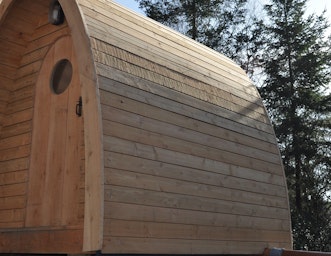
Compost Toilets (Only two places left)
17th August 2024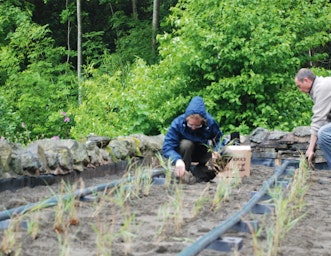
Reedbeds and Waste Water Management
18th August 2024Would you like to stay at CAT during your short course? Simply add the short course to your cart and then choose from the options provided.
Additional options include:
- Bed and Breakfast the night before your course starts (Friday 8 March) – £80 single
- Dinner the night before your course starts (Friday 8 March)
- Accommodation during your course – £70 single
If you have any questions, please email courses@cat.org.uk
Searching Availability...

